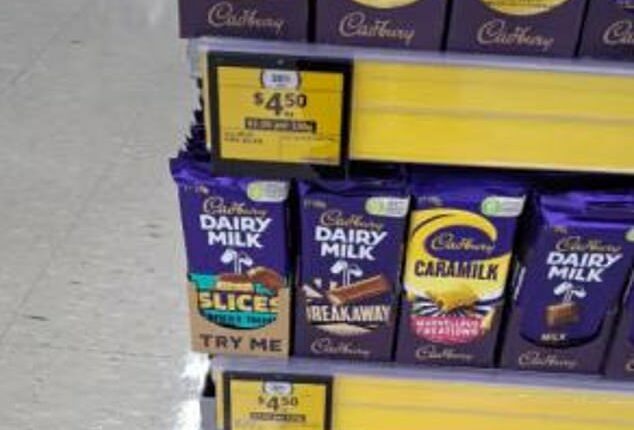Share this @internewscast.com
Woolworths customers in Australia have expressed frustration upon learning that a beloved local treat is more affordable across the Tasman in New Zealand.
The discontent began when a shopper posted on Reddit, revealing that an 180g block of Cadbury chocolate was available at a discount in New Zealand, priced at NZD$4.50, a reduction of 20 percent.
Adding to the surprise, the same chocolate was being sold for an even lower price of NZD$2.69 at Pak’n’Save, a popular New Zealand supermarket chain.
‘The price gouging is ridiculous,’ the caption read.
The post quickly attracted comments from Australians, who were quick to point out the higher cost of the same product in their own country.
Interestingly, Cadbury manufactures its chocolate at its primary facility located in Claremont, Tasmania. This factory is notable for being the largest Cadbury production site in the Southern Hemisphere.
Despite this local production, in Australia, the typical price for a 180g block of Cadbury chocolate is around $8, although it occasionally goes on sale, dropping to as low as $4.
In New Zealand, even when the chocolate is not on special, it is still cheaper at NZD$5.99 (AUD$5.30).

The shopper found the Cadbury block of chocolate for sale for NZD$4.50 at a Woolworths in New Zealand
‘What confuses me is that they’re made in Australia but in NZ Woolies they are the same price, on sale for NZ$4.50 reduced from NZ$5.99,’ one outraged Aussie wrote on the social media platform.
‘The exchange rate is $1.13 so after export/logistics why are they cheaper in NZ?’
A second person commented: ‘The fact Cadbury chocolate is cheaper overseas, when it’s literally made in Australia, is proof enough of price gouging.’
‘Same with Tim Tams. Made in Aussie but always cheaper here in NZ. But then again, what’s made here in NZ is usually cheaper to buy in Aussie,’ a third person chimed in.
Woolworths told Daily Mail the retail giant operates separate buying arrangements across Australia and New Zealand.
‘The difference in price between Australia and New Zealand can be influenced by factors including different tax arrangements and rates, variations in purchase volumes and different promotional pricing activities,’ a Woolworths spokesperson said.
‘We know our customers on both sides of the Tasman continue to face cost of living pressures, and delivering value wherever we can continues to be our priority.
‘We are working with Mondelez on providing great offers to our customers… to ensure our customers can still enjoy their favourite sweets.’

Aussie shoppers can buy a 180g block of Cadbury chocolate at Woolworths for a reduced price of $4, down from $8, as of Tuesday
Woolworths added global chocolate supplies and prices had also been impacted by a shortage of cocoa and surging input costs in recent years.
It comes as the federal government is set to introduce tough new legislation designed to stop major supermarkets from price gouging.
The Albanese government is releasing draft legislation, which will undergo a two-week consultation period with the Treasury until November 3.
Under the proposed laws, major supermarkets like Woolworths and Coles could face multimillion-dollar penalties for excessive pricing.
Assistant Minister for Productivity, Competition, Charities and Treasury Andrew Leigh told reporters on Monday the proposed laws would mirror similar pricing rules seen in Europe and should come into effect by the end of 2025.
‘Excessive pricing rules exist in other jurisdictions, including the United Kingdom and the European Union,’ Mr Leigh said.
‘Our approach will draw on what has been done in other countries, and we will put in place a backstop of fairness.’
‘We know many Australians are feeling under pressure from the cost of the weekly shop, and our price gouging laws, which are out for consultation today will ensure that we look after consumers.’
The report, put to the Treasury, did not claim Coles and Woolworths had a duopoly on the market in Australia.
However, it did claim the supermarket industry was ‘highly concentrated with an oligopoly structure, dominated by Coles and Woolworths’.
Leigh explained the laws would target companies that have a turnover of more than $30billion.
‘The penalty for price gouging right now is zero,’ he said.
‘We’re putting in place a system which will punish supermarkets that do the wrong thing with multimillion-dollar fines.
‘The fines are $10m, three times the ill-gotten gains, or up to 10 per cent of the turnover. For multibillion-dollar companies, these are significant fines.’
An ACCC inquiry, which was started after Coles and Woolworths faced price gouging allegations during the pandemic, found the supermarket giants to be some of the most profitable in the world.
The consumer watchdog did not find conclusive evidence of price gouging but found Coles and Woolworths accounted for two-thirds of Australia’s national grocery sales.
The supermarkets both recorded whopping profits in the year ending June 2025, with Coles earning $1.08billion and Woolworths $1.4billion.











